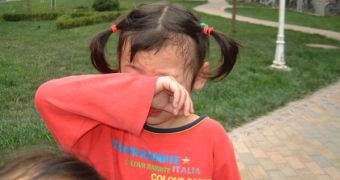People tend to start crying from a large number of reasons, ranging from disappointments, bad news, failures and severe pain, but experts have thus far failed to understand the exact role that this behavior has for our species. Tel Aviv University (TAU) evolutionary biologist and researcher Oren Hasson now proposes that tears running down our cheeks may, in fact, act like a signal to other humans, showing that we have lowered our defenses. This, in turn, could lead to others’ around us being emotionally blinded and unable to “attack,” LiveScience reports.
“Crying is a highly evolved behavior. My analysis suggests that by blurring vision, tears lower defenses and reliably function as signals of submission, a cry for help, and even in a mutual display of attachment and as a group display of cohesion,” Hasson says. Previous explanations of crying have made the habit to be a need for releasing harmful chemicals from the body, a way for newborns to signal health problems, or simply a way to make a sad person feel better. But the TAU scientist proposes that seeing tears handicaps aggressive behavior in potential attackers.
He also underlines the double advantage that crying has in desperate, public situations. On the one hand, the victim shows the aggressor that they are submissive and ready to solicit mercy. But, on the other hand, the person doing the crying is also hoping that people passing by will be sufficiently impressed by their suffering and empathetic enough to jump to their aid. As such, crying may have played a very important evolutionary role for the early humans, creating bonds, and bringing communities closer together against outside intrusion.
“If you can get a mutual display of lowered defenses, that means we can bond, that shows that we are really friends who share the same emotions. This is strictly human. Of course, the efficacy of this evolutionary behavior always depends on who you're with when you cry those buckets of tears, and it probably won't be effective in places, like at work, when emotions should be hidden,” Hasson tells the news outlet. Other researchers agree with his hypothesis as well.
“[The research] offers the most plausible hypothesis about the evolved function of tears and crying. Others have speculated about [a] possible function of tears, but the notion that they operate through handicapping is highly original,” University of Texas at Austin evolutionary psychologist David Buss, who has not been part of the new study, adds.

 14 DAY TRIAL //
14 DAY TRIAL //